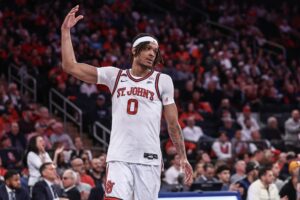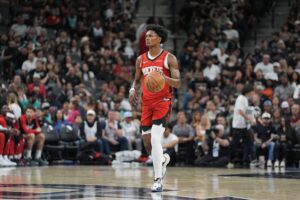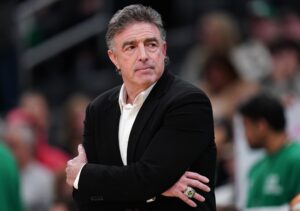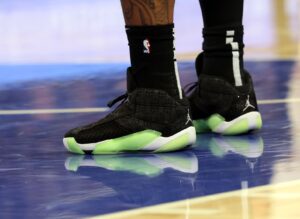In a move that will undoubtedly have many in Los Angeles breathing a sigh of relief, Doc Rivers will no longer be in charge of the L.A. Clippers‘ front office. Executive Vice President of Basketball Operations and former NBA coach Lawrence Frank will step in to oversee basketball operations, including general manager Dave Wohl. Frank will report directly to Clippers owner Steve Ballmer.
ESPN’s Adrian Wojnarowski was first to break the news:
Story on ESPN: Clippers' Doc Rivers will return to primary duties of coach, freed of front office responsibilities. https://t.co/r2hfOCbcUc
— Adrian Wojnarowski (@wojespn) August 4, 2017
Rivers will remain with the Clippers in his coaching capacity.
Los Angeles Clippers Relieve Doc Rivers of Front Office Duties
The Clippers released a statement announcing the change as an “expansion” of the franchise’s “leadership team.” In the statement, Rivers is quoted as saying, “I am committed to the Clippers’ success and am excited to focus on the coaching side, as two-thirds of our roster will be new this year.”
Nice spin and pleasant quote, but is there really any question that this is a demotion for Rivers?
Rivers’ Unremarkable Front Office Performance
Three years ago, the Clippers restructured their front office and promoted Rivers to President of Basketball Operations. The promotion was odd, in that Rivers had no formal front office experience. Regardless, he was put in complete control of the selection, signing, and development of L.A.’s roster, while simultaneously maintaining head coaching duties. The experiment did not work. Rivers was simply unable to balance the responsibilities of head coach and general manager well.
Rivers inherited the Clippers’ “Big Three” of Chris Paul, Blake Griffin, and DeAndre Jordan but failed to build on this core to create a true playoff contender in the West. His attempts over the last few off-seasons to upgrade the team’s second unit and secure a decent small forward failed miserably. Moreover, Rivers developed a reputation for making ill-advised moves and trading away decent assets for lesser ones. Remember the waste of a mid-level exception on Spencer Hawes? The downgrade from scrappy Matt Barnes to crappy Lance Stephenson? The disappointment of Jeff Green?
Rivers and His Son
Perhaps the most head-scratching moves made by Rivers in his dual role as head coach and general manager involved his son Austin Rivers. In 2015, Rivers facilitated a three-team trade to bring the then under-achieving Duke graduate to Los Angeles. At the time, the Clippers desperately needed a small forward and draft picks to trade. Rivers dealt away both for an unexceptional combo guard with his DNA. In exchange for the younger Rivers, the Clippers sent forward Chris Douglas-Roberts and a 2017 second-round draft pick to the Boston Celtics. They also traded swingman Reggie Bullock to the Phoenix Suns. The Celtics received forward Shavlik Randolph from Phoenix in the trade. Was Austin Rivers worth losing three players? Probably not. The move left many crying nepotism.
Recently, in the media frenzy that followed Paul’s trade to the Houston Rockets, SportsCenter anchor Michael Eaves reported that Rivers turned down a trade that would have brought Carmelo Anthony to Los Angeles in exchange for his son and Jamal Crawford. “That event led Paul to feel that keeping his son on the roster was more important to Doc than improving the team,” Eaves wrote. Although neither of the Rivers has commented publically on the report, the idea of an NBA coach putting family over his franchise left a bad taste in many mouths.
Despite being revered by many for his coaching abilities, Doc Rivers simply failed to prove himself as an executive. As a result, his accomplishments in Los Angeles are probably best described to date as legendarily mediocre.
Rivers Must Establish (Re-Establish?) Himself as an Elite Level Coach
Have Rivers’ inabilities as a general manager overshadowed his coaching abilities, or is he overrated as a coach? This coming season may answer that question. It is critical that Rivers prove himself in 2017-18 as a top-tier coach. If he fails to do so, the Clippers should part ways with him.
Rivers was at his best with the Celtics, but was it due to his coaching skills or favorable circumstances? Danny Ainge handled the role of team president for the Celtics at the time of Rivers’ success in Boston, and he did so exceptionally well. Ainge landed Ray Allen, Kevin Garnett, and a number of key free agents in the 2007 off-season, all of whom contributed mightily to the Celtics 2007-08 NBA championship. Prior to the 2007-08 season, Rivers’ playoff record as a coach was an unimpressive 8-14. Draw your own conclusions.
Dual Role is a Dying Model
It’s hard to both coach and build a team simultaneously. It’s also highly undesirable. The person who signs a player’s employment contract, negotiates with his agent, and has the ability to trade him on a whim can’t simultaneously be effective as that player’s teacher, confidant, mentor, and advisor. Such a setup will almost always breed contempt and lead to issues in the locker room.
With Rivers’ demotion, only three teams in the NBA still have coaches who also run the front office: the Detroit Pistons (Stan Van Gundy), the Minnesota Timberwolves (Tom Thibodeau), and the San Antonio Spurs (Gregg Popovich). Earlier this off-season, Mike Budenholzer resigned as the Atlanta Hawks’ president of basketball operations, which was part of the Hawks’ front office restructuring. As is the case with Rivers, Budenholzer will remain with the Hawks and focus solely on coaching.
Main Photo:
Embed from Getty Images






